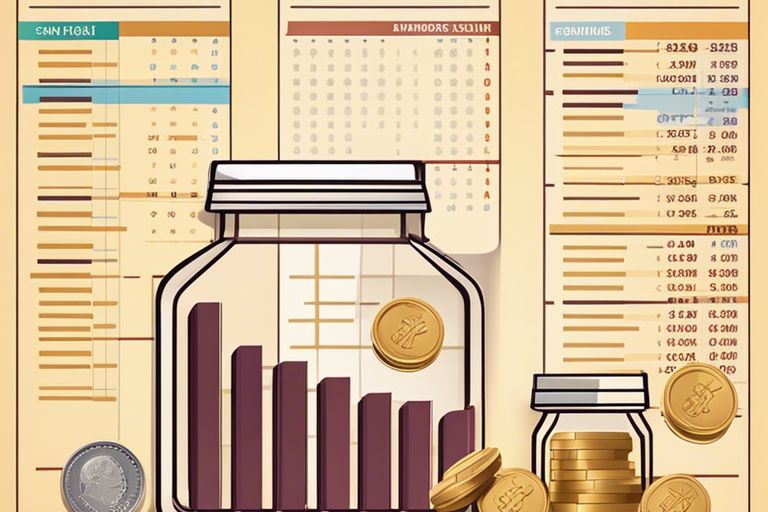You want to achieve your financial goals, but do you have a plan in place to make it happen? Smart budgeting is the key to effectively allocating funds towards your objectives. In this guide, we will show you the necessary steps to manage your money wisely and reach your financial milestones. By following these tips, you can gain control of your finances and work towards a brighter financial future.
Key Takeaways:
- Set Clear Financial Goals: Before creating a budget, define your financial goals such as saving for a house, paying off debt, or building an emergency fund.
- Prioritize Your Spending: Allocate funds based on your priorities. Focus on necessarys like housing, food, and debt repayment before allocating money to wants or non-necessary expenses.
- Track and Adjust Your Budget Regularly: Monitor your spending regularly to ensure you are staying on track with your budget. Adjust your allocations as needed to meet changing financial goals or circumstances.
Getting Started: Setting Up Your Smart Budget
Understanding Your Income: How-To Identify All Sources
Budgeting begins with understanding your income sources. Make a list of all the ways money comes in regularly, including salaries, bonuses, investments, and any other sources.
Listing Essential and Non-Essential Expenses: Tips for Categorization
Your next step is to list down all your expenses. Categorize them into important and non-important to distinguish between what you need versus what you want.
- Essential expenses include rent, utilities, groceries, and other necessities.
- Non-important expenses are items like dining out, entertainment, and luxury purchases.
After categorizing your expenses, you can prioritize your spending accordingly, ensuring you cover the importants before indulging in non-importants.
Getting a clear picture of your income and expenses is crucial for effective budgeting. By understanding where your money comes from and where it goes, you can minimize wasteful spending and allocate funds strategically towards your financial goals.
Goal Setting: Defining Your Financial Objectives
There’s no denying the importance of setting clear financial goals to achieve success in managing your budget effectively. Without a roadmap in place, it can be challenging to make informed decisions about where to allocate your funds.
Short-Term Vs. Long-Term Goals: Factors to Consider
- Timeframe: Short-term goals are typically achievable within a year, while long-term goals may take several years to accomplish.
- Specificity: Short-term goals are more focused and precise, while long-term goals may be broader and more far-reaching.
- Priority: Consider which goals are most urgent and important to your overall financial well-being.
Though it may be tempting to focus solely on short-term goals, it’s crucial to consider the bigger picture and allocate funds accordingly to achieve a balance between immediate needs and long-term objectives.
Tips on Prioritizing Your Financial Milestones
- Evaluate Your Needs: Assess your current financial situation and identify areas where you need to focus your resources.
- Set Clear Goals: Define specific, measurable objectives that align with your values and priorities.
- Review Regularly: Regularly review and adjust your goals to stay on track and make necessary revisions as circumstances change.
Now, when it comes to prioritizing your financial milestones, it’s crucial to consider what will have the most significant impact on your overall financial well-being. By focusing on the most critical goals first, you can ensure that you are making meaningful progress towards achieving financial success.
- Consider: Prioritizing your financial milestones based on their importance and impact on your long-term financial stability.
Allocating Funds: Strategies for Effective Distribution
How-To Allocate for Fixed and Variable Expenses
To effectively manage your budget, start by allocating funds for fixed expenses such as rent, utilities, and car payments. These are stable, recurring costs that remain relatively constant each month. Next, allocate funds for variable expenses like groceries, entertainment, and clothing. These costs can fluctuate, so it’s important to estimate and plan accordingly.
The Role of an Emergency Fund: Tips for Saving
An emergency fund is a crucial part of financial planning. To build one, set aside a portion of your income each month into a separate savings account. Aim to save at least three to six months’ worth of living expenses to cover unexpected costs like medical bills or car repairs.
- Start by creating a budget to determine how much you can afford to save each month.
- Automate your savings by setting up recurring transfers from your checking account to your emergency fund.
- Avoid dipping into your emergency fund for non-important expenses to ensure it’s there when you truly need it.
Assume that having an emergency fund provides a sense of security and peace of mind, knowing that you’re financially prepared for unexpected events.
Plus
Distribution of funds plays a critical role in reaching your financial goals. It’s important to prioritize your expenses and allocate funds wisely to ensure you’re on track to achieve your objectives. Bear in mind, effective distribution of funds is key to financial success.
Monitoring and Adjusting Your Budget
To set achievable financial goals – Better Money Habits, it is important to monitor and adjust your budget regularly. This process ensures that you stay on track and make progress towards your financial objectives.
How-To Track Your Spending and Stay on Course
To stay on top of your finances, it is crucial to track your spending. Keep a record of all your expenses, whether big or small, to have a clear picture of where your money is going. Utilize budgeting apps or spreadsheets to categorize your expenses and see if you are overspending in any areas. Regularly reviewing your spending habits will help you make informed decisions on where adjustments are needed to meet your financial goals.
When to Reassess: Tips for Budget Adjustment Factors
Tips for budget adjustments are necessary to ensure you are constantly optimizing your financial planning. Regularly reassess your budget when significant life changes occur, such as a new job, marriage, or the birth of a child. Additionally, reevaluate your budget if you consistently overspend in certain categories or if unexpected expenses arise. By staying proactive and flexible in your budgeting approach, you can adapt to changing circumstances and keep your financial goals within reach.
- Significant life changes: such as a new job, marriage, or the birth of a child
- Consistently overspending: in certain categories
- Unexpected expenses: that may impact your budget
Adjustment factors to consider include significant life changes, overspending, and unexpected expenses. Regularly reassessing your budget based on these factors will help you stay on track and make necessary changes to achieve your financial goals. Be mindful of, financial flexibility is key to long-term financial success.

Harnessing Tools and Technology
Despite the convenience of modern technology, many people still struggle to manage their finances effectively. Fortunately, there are a plethora of tools and resources available to help individuals gain control over their budget and achieve their financial goals.
How-To Use Budgeting Apps and Financial Software
One of the easiest ways to track your spending and stay on top of your budget is by utilizing budgeting apps and financial software. These tools can sync all your accounts, categorize your expenses, and provide insights into your spending habits. By regularly reviewing your financial data through these apps, you can make more informed decisions about where to cut back and where to invest.
Tips for Choosing the Right Tools for Your Financial Goals
To ensure you select the best tools for your financial objectives, consider the following tips:
- Define Your Goals: Before choosing a budgeting app or financial software, identify your financial goals. Whether you want to save for a vacation, pay off debt, or build an emergency fund, it’s important to have a clear objective in mind.
- Consider Your Budgeting Style: Some apps focus on tracking every penny you spend, while others offer a more high-level view of your finances. Choose a tool that aligns with your preferred budgeting method to ensure you stick with it long-term.
- Check Compatibility: Ensure that the app or software you choose is compatible with your devices and operating systems to avoid any technical issues down the line.
After selecting the right tools for your financial goals, make sure to periodically assess their effectiveness and make adjustments as needed.
To ensure you select the best tools for your financial objectives, consider the following tips:
- Define Your Goals: Before choosing a budgeting app or financial software, identify your financial goals. Whether you want to save for a vacation, pay off debt, or build an emergency fund, it’s important to have a clear objective in mind.
- Consider Your Budgeting Style: Some apps focus on tracking every penny you spend, while others offer a more high-level view of your finances. Choose a tool that aligns with your preferred budgeting method to ensure you stick with it long-term.
- Check Compatibility: Ensure that the app or software you choose is compatible with your devices and operating systems to avoid any technical issues down the line.
After selecting the right tools for your financial goals, make sure to periodically assess their effectiveness and make adjustments as needed.
Tips for Choosing the Right Tools for Your Financial Goals
Another crucial aspect to consider when choosing financial tools is their security features. Make sure the apps or software you use have robust security measures in place to protect your sensitive financial information from cyber threats. Additionally, look for tools that offer features like automatic transaction categorization, goal tracking, and customizable budget categories to tailor the tool to your specific needs.
To wrap up
On the whole, smart budgeting is a crucial component in achieving your financial goals. By carefully analyzing your income and expenses, setting up a realistic budget, and prioritizing your spending, you can allocate your funds efficiently to meet your objectives. Remember to regularly review and adjust your budget as needed, staying focused on your financial goals and making informed decisions about your money. With dedication and sound budgeting practices, you can take control of your finances and work towards a secure and prosperous future.
FAQ
Q: What is smart budgeting?
A: Smart budgeting is a proactive approach to managing your finances by creating a plan to allocate funds in a way that aligns with your financial goals and priorities. It involves tracking your expenses, setting realistic savings targets, and making informed decisions about where to spend your money.
Q: Why is it important to allocate funds to achieve financial goals?
A: Allocating funds to achieve financial goals is crucial because it helps you prioritize what matters most to you and ensure that your money is being used effectively. By setting aside money for specific goals, such as saving for a house or retirement, you are more likely to stay focused and motivated to reach those targets.
How can I start allocating funds to achieve my financial goals?
A: To start allocating funds to achieve your financial goals, begin by determining your short-term and long-term objectives. Create a budget that outlines your income, expenses, and savings goals. Track your spending to identify areas where you can cut back, and allocate those savings towards your financial goals. Regularly review and adjust your budget as needed to stay on track.




